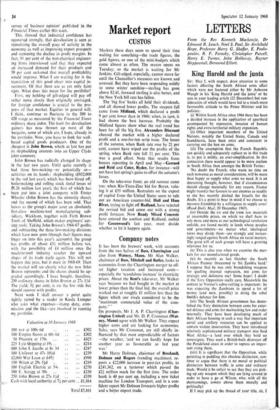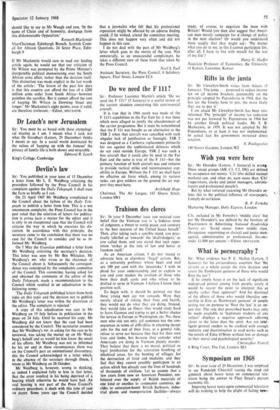King Harold and the junta
LETTERS
From the Rev Kenneth Mackenzie, Dr Edmund R. Leach, Noel S. Paul, Sir Archibald Hope, Professor Harry G. Shaffer, E. Poulo- poulos, R. F. Fernsby, Christopher Purcell, Harry E. Turner, John Holloway, Rayner Heppenstall, Desmond Elliott. .
Sir: May I, with respect, draw attention to some factors affecting the South African arms affair which were not featured either by Mr Auberon Waugh in his 'King Harold and the junta' or by you in your leading article (22 December) but con- sideration of which would have led to a much more favourable attitude to the Prime Minister and his policies:
(i) Within South Africa since 1964 there has been a decided increase in the application of apartheid accompanied by repression, invasion of human rights and extra-territorial military expansion.
(ii) Other important members of the United Nations, notably the United States, Canada and Scandinavia, have been strict and consistent in carrying out the ban on arms.
(iii) The assumption that the French Republic can quickly and adequately replace us in this trade is, to put it mildly, an over-simplification. In this connection there would appear to be more realism in South Africa than amongst the British Tories:
'No doubt the French, who waste no time on such nonsense as moral considerations, will be more than happy to supply what arms we need. It is an interesting thought, however, that if circumstances should change materially for any reason, France might transfer her favours to our enemies as readily as she has recently ditched the Israelis for the Arabs. It's a point to bear in mind if we choose to measure friendship by a willingness to supply arms' (Rand Daily Mail, 20 December 1967).
(iv) Outside the us and the USSR raw materials at reasonable prices, on which we shall have to rely more and more as our technological revolution unfolds, are found mainly in lands whose peoples ' and governments—no matter what ideological views may divide them—are strongly and increas- ingly ranged against South Africa on racial matters. The good will of such groups will have a growing relevance for us.
(v) This is also true when we examine the mar- kets for our manufactured goods.
(vi) As recently as last October the South African Premier threatened to 'hit Zambia hard.' I suppose that he was only brandishing weapons for quelling internal repression, not arms for strategic and defensive use! Some hope! I doubt if the Tory Opposition really care. Meanwhile the context to Vorster's sabre-rattling is important: he was expecting the Zambians to spend a lot of money (and men, possibly) in doing the rebel Smith's defence for him.
(vii) The South African government has, demo- lished the Tory distinction between arms for exter- nal defence and arms for maintaining law and order internally. They have been developing much of their African housing in such a way that important aerial and artillery resources can be applied to contain violent insurrection. They have introduced relatively sophisticated military transport into Suid West Afrika—a land over which they hold no sovereignty. They used a British-built destroyer off the Pondoland coast in order to repress an impor- tant rising there.
(viii) It is significant that the Opposition, while persisting in peddling this obsolete distinction, con- tinue to argue that there is no moral or political distinction between traffic in arms and ordinary trade. Would it be unfair to say that they are pick- ing up any weapon which they see lying around in order to have a go at Wilson, who, with all his shortcomings, towers above them morally and politically!
If I may pick up the thread of your title. sir, I should like to say to Mr Waugh and you, 'In the name of Christ and of humanity, disengage‘ from this dishonourable Opposition.'
Kenneth Mackenzie Vice-Chairman, Edinburgh Branch, Scottish Coun- cil for African Questions, 24 Seton Place, Edin- burgh 9 If Mr Mackenzie would care to read our leading article again, he would see that our criticism of Mr Wilson was prompted by the Prime Minister's disreputable political manoeuvring over the South Afribin arms affair, rather than the decision itself. This distinction was made explicit in the last words of the article: 'The lesson of the past few days is that this country can afford the loss of a £200 million arms order from South Africa—however pointless the sacrifice. But it cannot afford the cost of keeping Mr Wilson in Downing Street any longer.' Mr Mackenzie's eight points, even if_valid, are therefore irrelevant.—Editor, SPECTATOR.































 Previous page
Previous page